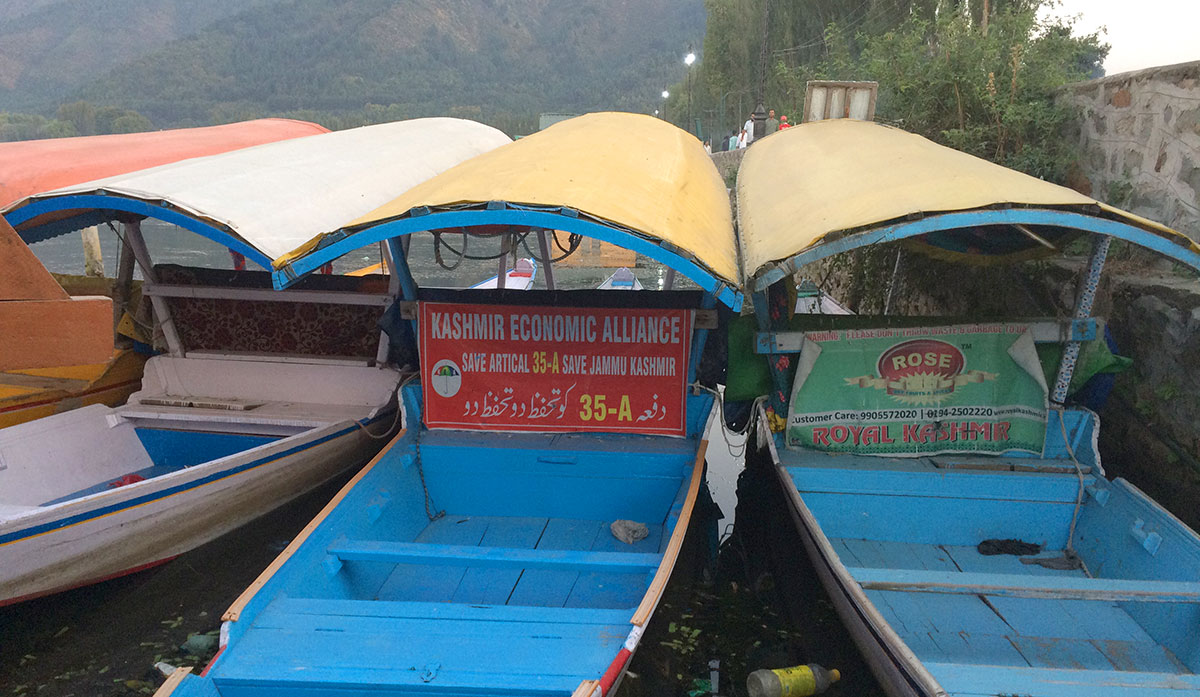The abrupt August 4, order asking tourists and pilgrims to leave Kashmir marked the end of a busy tourist season. Shams Irfan met the related professionals to report about the lost of opportunities and jobs

Abdul Khaliq starts his day early by rowing his decorated Shikara (boat) through rough waters of Dal Lake to reach Ghatt (Jetty) No 9, his Shikara’s designated stand on Srinagar’s Boulevard. After parking his Shikara, he waits for his colleagues to show up.
One after another his colleagues Shikaras emerge in the distance lighting Khaliq’s sprits. They spend their day at the Jetty stand recalling pre-August 5, days when they would hardly get time to meet.
“Now we sit together entire day and chat as there is no work,” said Khaliq. “What else can we do?”
Khaliq and others are joined by Razaq Ahmad, an elderly Shikara man who now works as book-keeper for Shikara owners associated with Jetty No 9. There are 24 Shikaras registered at this Jetty stand. “For first forty days we stayed at home,” said Razak. “Then we came out to kill time and meet each other.”
Razaq maintains a register where he notes down names of all Shikara owners against the amount each one of them has earned on a daily basis. Since last fifty days the register is blank as there has been no work.
“We have a different system of work here. When a tourist comes to hire a Shikara, he hires it through me,” said Razaq looking hopefully at the blank register.
At the end of the ride tourist pays Razaq instead of Shikara owner directly. Then at the end of ten days the collected amount is distributed among all 24 Shikara owners equally irrespective of their work or individual earnings. “This system ensures that everyone gets fair share even in hard times,” said Razaq.
But Razaq is struggling to keep his team fed since August 5. “A good tourist season was ruined midway,” feels Razaq. “All our savings are gone in last fifty days. I don’t know how we will survive now.”
Razaq’s concerns are more than just dwindling earnings of his team. He knows peak tourism season is already nearing its end.
This year the tourist footfall was good in Kashmir compared to last few years, especially since July 2016.
The story is almost same on every other jetty stand on tourist hub boulevard road.
After completing his graduation Atif, 29, applied for a number of private and government jobs without any luck. A resident of Nishat, Atif then started working for a number of houseboat owners as their agent. During peak tourist season, he would start his day early and shuttle between jetty stands looking for tourists who wish to stay in a houseboat. “I used to earn between Rs 1000 and 1500 on a daily basis as commission,” said Atif. This amount sustained Atif and his small family of five and helped them live modestly. “But lack of work since August 5, has drained my savings and put my future in risk,” said Atif as he sits near a jetty stand looking at passing vehicles with hope.
Over the years Atif had succeeded in establishing contacts with travel agents based in Delhi, West Bengal, Mumbai and Ahmedabad. “I had bookings till October. But with entire communication shut, I am not even able to call them,” said Atif.
Ahmed, 27, works as a waiter for a luxury houseboat chain for the last ten years. A resident of Tangmarg in Baramulla district was home for the weekend when tourists were asked to leave Kashmir abruptly on August 2. He cut his visit short and reached Srinagar quickly. “All our houseboats were packed with tourists when they were asked to leave,” said Ahmed.
After the August 5, communication and internet blockade Ahmed went home thinking it would be over in a few days. Like everybody else he was wrong. “I came to Srinagar just to check if my job is still secure or not,” said Ahmed.
The same insecurity has kept other workers from his village in a dilemma. “We cannot even ask for our salaries as we know entire tourism industry was hit badly,” said Ali, 26, a fresher who has joined a local hotel after completing his hotel management degree. Ali, who hails from Bandipora, was happy to help his aged father monetarily. “Now I have no idea what will I do as tourism season is almost over,” said Ali.
Gaffar, 65, has rented out three shops to a non-local who ran a restaurant exclusive for Gujarati tourists. He had received only ten percent of the rent in advance and the rest was promised to be paid on monthly basis. “He has left along with his workers. Now I have no contact with him. I don’t know if I will be able to get my money or not,” said Gaffar.
But Gaffar is not alone. A number of restaurants located on the Boulevard are leased out to non-locals who pay in instalments. After August 5, all non-locals left the valley leaving shop owners in a fix. “We have no communication with them. I don’t know what will happen next,” said Gaffar’s childhood friend.















